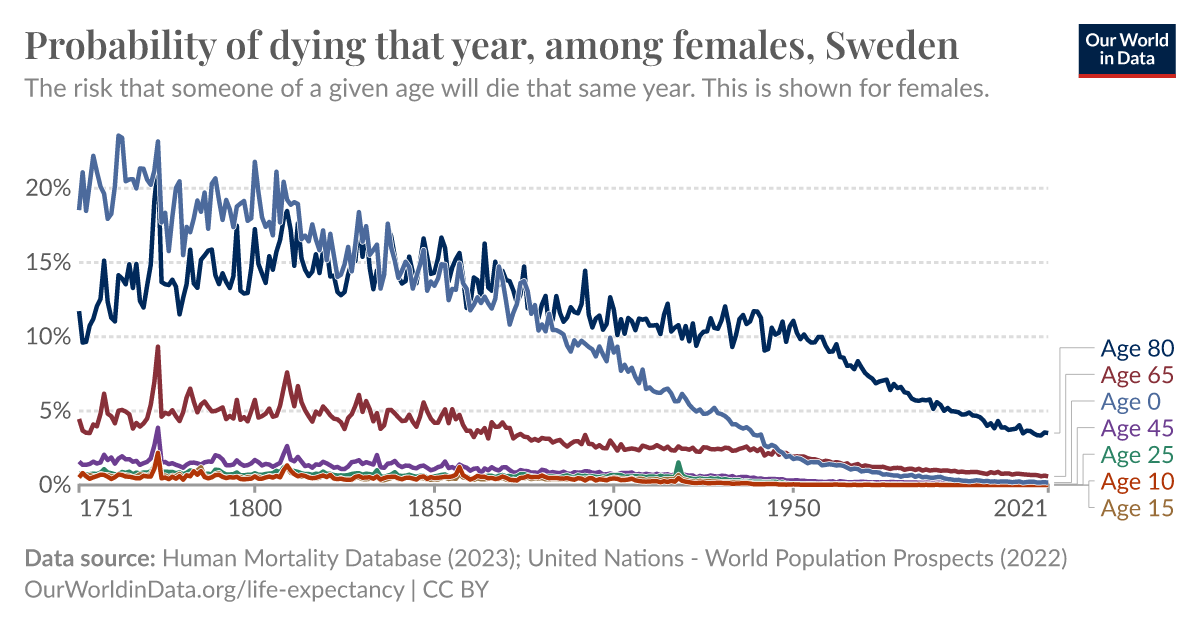Until about 1885, female newborns in Sweden had a similar risk of dying as 80-year-old women. “This progress has come from improvements in hygiene, clean water and sanitation, vaccination, nutrition, neonatal healthcare, and surgery.”



Advertise here with Carbon Ads
This site is made possible by member support. 💞
Big thanks to Arcustech for hosting the site and offering amazing tech support.
When you buy through links on kottke.org, I may earn an affiliate commission. Thanks for supporting the site!
kottke.org. home of fine hypertext products since 1998.





Comments 4
"In 1900, the average U.S. life expectancy was 47 years old." That's how Derek Thompson starts his Plain English podcast discussing advances in human lifespan and how long they can continue. I recommend giving it a listen.
Plain English is one of my favorite podcasts, and I have listened to the episode about how Happiness is a Time Machine multiple times.
It's very interesting to me that it seems easier to reduce infant mortality than geriatric. At the same time that the below-zero mortality rate dropped below 3%, the geriatric rate remained more or less the same. I suppose it's easier to keep babies alive with vaccines, maternal support, and healthcare access than it is to prolong someone's life?
Just from eyeballing it, it looks like the 65 yo rate started declining at the same time as the 85 one. I wonder what sort of late-in-life interventions are helping here, or if it's just a reflection of a healthier society overall?
This weekend I celebrated my daughter's 1st birthday in the hospital with a high fever (104.8) - this hits hard. She didn't have anything crazy, just a combo of different viruses. All i could think was that "gee we're lucky that we live in a time where we can cheaply give her massive rotations of Tylenol and Motrin" - such a boring illness but in the 1900s it would have been crushing.
I just finished the book Factfulness by Hans Rosling. Highly recommended if you want to have a good intuition/understanding of why this happens globally. The top line impacting this graph is simply a reduction in poverty (and it's definitely not just Sweden, this is happening everywhere- all countries, all continents).
There's also a TED talk which I haven't seen, but I'm guessing covers similar topics.
https://bookshop.org/p/books/factfulness-ten-reasons-we-re-wrong-about-the-world-and-why-things-are-better-than-you-think-hans-rosling/8492636?ean=9781250123824
Hello! In order to comment or fave, you need to be a current kottke.org member. If you'd like to sign up for a membership to support the site and join the conversation, you can explore your options here.
Existing members can sign in here. If you're a former member, you can renew your membership.
Note: If you are a member and tried to log in, it didn't work, and now you're stuck in a neverending login loop of death, try disabling any ad blockers or extensions that you have installed on your browser...sometimes they can interfere with the Memberful links. Still having trouble? Email me!
In order to comment or fave, you need to be a current kottke.org member. Check out your options for renewal.
This is the name that'll be displayed next to comments you make on kottke.org; your email will not be displayed publicly. I'd encourage you to use your real name (or at least your first name and last initial) but you can also pick something that you go by when you participate in communities online. Choose something durable and reasonably unique (not "Me" or "anon"). Please don't change this often. No impersonation.
Note: I'm letting folks change their display names because the membership service that kottke.org uses collects full names and I thought some people might not want their names displayed publicly here. If it gets abused, I might disable this feature.
If you feel like this comment goes against the grain of the community guidelines or is otherwise inappropriate, please let me know and I will take a look at it.
Hello! In order to leave a comment, you need to be a current kottke.org member. If you'd like to sign up for a membership to support the site and join the conversation, you can explore your options here.
Existing members can sign in here. If you're a former member, you can renew your membership.
Note: If you are a member and tried to log in, it didn't work, and now you're stuck in a neverending login loop of death, try disabling any ad blockers or extensions that you have installed on your browser...sometimes they can interfere with the Memberful links. Still having trouble? Email me!